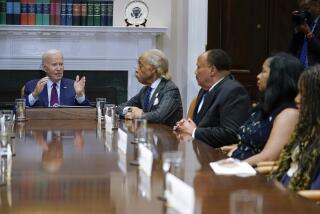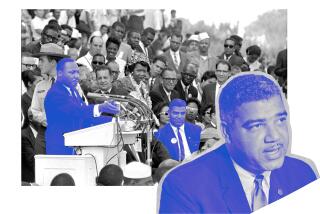Clinton Considers Panel to Review Race Relations
- Share via
WASHINGTON — President Clinton, seeking ways to capitalize on momentum from Monday’s “Million Man March” on Washington, is considering convening a White House conference on race relations and appointing a blue-ribbon commission to study the problem, his aides said Wednesday.
Black leaders, among others, have appealed for Clinton to appoint such a commission to address the march’s unmistakable message--a moving appeal for new approaches to the plight of African American males. And the idea quickly drew support from Republicans as well as Democrats.
But the impulse to build on the positive impact on the nation of hundreds of thousands of black men assembled on the Mall in the name of atonement and personal responsibility was also tinged with caution.
At the White House and elsewhere in Washington, political strategists were aware that the challenges of crime, poverty, drugs and family disintegration in the black community are deadly serious. They are also politically explosive, especially for Democrats, whose long identification with blacks and other minorities has alienated some white voters.
As a result, the White House chose its words carefully in discussing a high-profile conference.
“A lot of different ideas have been put forward and a White House conference is one of the possibilities, but the President is reserving judgment for now on exactly what to do,” said White House Press Secretary Mike McCurry. “He wants to build on the momentum of the positive aspects of the march.”
One of the President’s senior advisers, George Stephanopoulos, noting that Clinton made a stirring speech on race relations Monday, the day of the march, told a reporter: “He has now made two of his biggest speeches on this issue. His statements have been clear and thoughtful. Maybe the march requires something more, maybe it doesn’t.”
*
And some Democrats went so far as to suggest that their party should not risk alienating middle-class white voters by moving too forcefully on the issue. “Anything that diverts us from our task of reconnecting with the broad middle class is a big mistake,” said a Democratic strategist with ties to the White House.
Reflecting on that ambivalence, Marlin Fitzwater, who served as White House press secretary in the Ronald Reagan and George Bush administrations, said: “The leaders here don’t know how to deal with it and they have the luxury of not having to deal with it if they really don’t want to because the march didn’t demand anything of them.”
The march differed from most past massive demonstrations here in that it had no agenda calling for specific action by the government or either political party. Instead of making such demands, most speakers focused on what black men themselves should do to make their communities better and safer.
Still, the massive demonstration caught the public’s interest as few events have since Dr. Martin Luther King Jr. and the civil rights movement of the 1960s. It drew daytime television ratings that rivaled first-run cable TV movies. And it has been the subject of intense discussion here and across the country in succeeding days.
Some Republicans leaders, including Senate Majority Leader Bob Dole of Kansas and House Speaker Newt Gingrich of Georgia, responded to the march chiefly by denouncing its prime organizer, Nation of Islam leader Louis Farrakhan, a fiery speaker with a record of racist and anti-Semitic remarks.
But others have looked for ways to build on the event.
Several black and white members of Congress sent Clinton a letter urging him to appoint a commission “to issue a report on the progress and failures that our nation has made on race since 1968.”
That was a reference to a commission appointed by President Lyndon B. Johnson, which in 1968 concluded that the nation was moving “toward two societies, one black, one white--separate and unequal.”
Rep. Charles E. Schumer (D-N.Y.), in proposing the appointment of a commission, said: “While our cities may not be burning, anger rages in the hearts of too many of its citizens.”
At least one Republican shared that sense of need for action. “There is something wrong about attitudes and perceptions in our society today,” said Rep. Bill McCollum (R-Fla.).
*
At the White House on Wednesday, Chief of Staff Leon E. Panetta met with aides and other advisers to discuss several different responses to the march, including a commission and a White House conference. But aides declined to identify the other options under consideration.
The. Rev. Jesse Jackson, a veteran of the civil rights movement of the 1960s and one of those who addressed the march, called on Clinton to convene a White House conference on urban policy and economic development.
“The President cannot just give a speech of anecdotes. It’s better than being hostile,” but it’s not enough, Jackson said.
The notion of a commission won wide praise. Rep. Christopher Shays (R-Conn.), a member with urban and suburban areas in his district, said that it is “an excellent idea--I’d like to be on it.”
Ed Gillespie, a spokesman for House Majority Leader Dick Armey (R-Tex.), praised the idea and vowed that “a lot more ideas will crop up” from Congress in the days ahead.
Rep. Robert T. Matsui (D-Sacramento) said he sees a commission as “a good response,” particularly if it can focus discussion next year during the election campaign.
But others portrayed the appointment of a commission as a maneuver to stall for time on a problem that has been endlessly diagnosed.
Rep. Julian C. Dixon (D-Los Angeles) argued that the issues raised by the march aren’t really suited for Congress to deal with as a body. Saying that he would try to deal with the issues by trying to promote candid conversation in community groups, Dixon said: “I don’t think Congress has the ability to heal. . . . Nor do we have the will, at this point.”
And Mary Frances Berry, who chairs the U.S. Commission on Civil Rights, said: “We don’t need another commission. The [1968] commission’s recommendations still haven’t been implemented. The commission said we had two separate societies, one white and one black and unequal--and we still do.”
More to Read
Get the L.A. Times Politics newsletter
Deeply reported insights into legislation, politics and policy from Sacramento, Washington and beyond. In your inbox twice per week.
You may occasionally receive promotional content from the Los Angeles Times.











